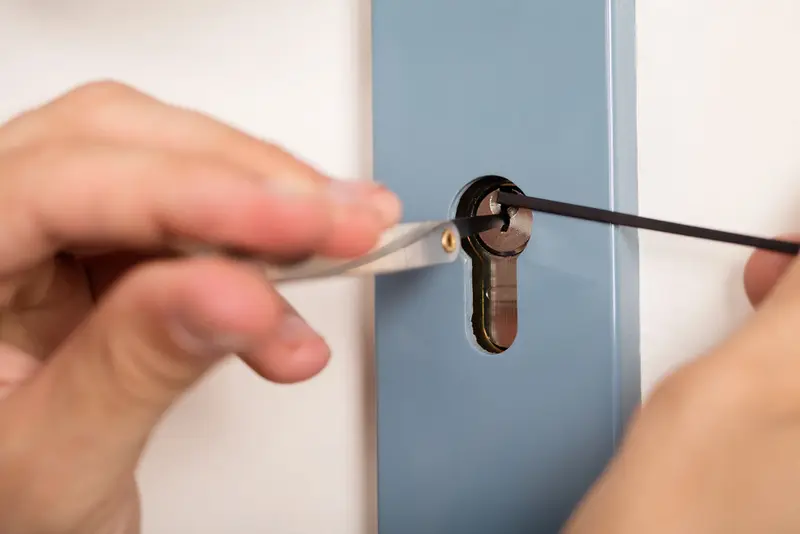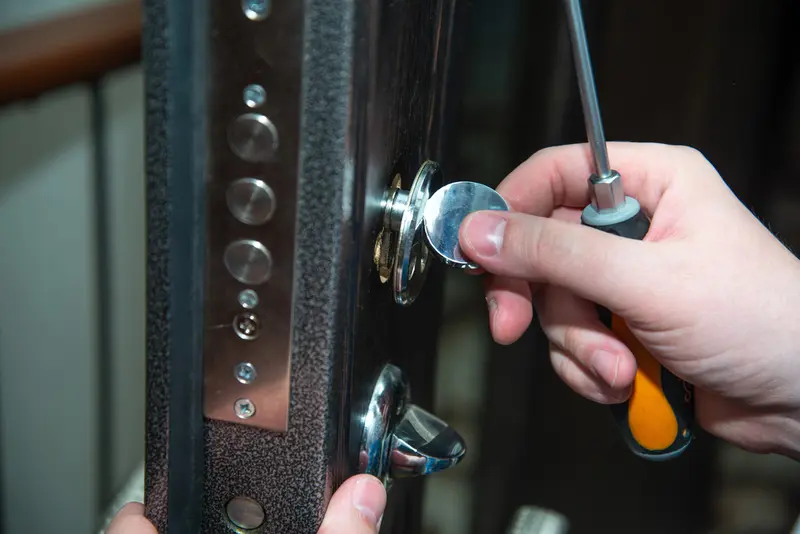Lost House Keys? Rekey Locks vs. Replace – The Ultimate Guide

Introduction: The Dreaded Lost House Keys Scenario
Discovering you’ve lost house keys can be a truly unsettling experience. Beyond the immediate inconvenience of being locked out, a wave of anxiety washes over you. Who has them? Could someone use them to access your home? These are completely valid concerns, and it’s important to address them promptly and effectively.
The good news is, you have options! Two common solutions are rekeying your locks or replacing them altogether. But what’s the difference, and which is the right choice for you? This comprehensive guide will break down the pros and cons of each approach, helping you make an informed decision to restore your peace of mind and secure your home.
What is Rekeying? Understanding the Process
Rekeying a lock involves altering the internal mechanism so that the old key no longer works, and a new key is required. Think of it as giving your lock a “fresh start” without actually changing the entire hardware.
The Mechanics of Rekeying
Inside your lock cylinder are small pins (or wafers in some locks) that align in a specific order to match the unique cuts of your key. When you rekey a lock, a locksmith will:
- Remove the lock cylinder.
- Take out the existing pins.
- Replace them with a new set of pins that correspond to a new key.
Essentially, the lock is being reprogrammed to only respond to the new key. The old key will no longer be able to turn the cylinder.
Benefits of Rekeying
- Cost-Effective: Rekeying is generally significantly cheaper than replacing the entire lock, especially if you have multiple locks to secure.
- Faster Process: Rekeying is usually a quicker process than a full lock replacement, minimizing disruption to your day.
- Preserves Existing Hardware: If you like the style and functionality of your current locks, rekeying allows you to keep them.
When is Rekeying a Good Option?
- You’ve lost your keys, but have no reason to believe they were stolen or are in the wrong hands (e.g., you suspect you dropped them somewhere).
- You’ve recently moved into a new home and want to ensure that previous owners or tenants no longer have access.
- You’ve given keys to contractors or service providers and want to revoke their access.
- You simply want to change the keys to your home for added security.
What is Lock Replacement? A Fresh Start for Your Security
Lock replacement involves removing the entire existing lock and installing a brand new one. This includes the lock cylinder, the exterior hardware, and sometimes even the strike plate on the door frame.
The Process of Lock Replacement
Lock replacement requires:
- Removing the old lock entirely.
- Selecting a new lock that fits your door and security needs.
- Installing the new lock, ensuring it’s properly aligned and functioning smoothly.
Benefits of Lock Replacement
- Enhanced Security: Replacing an old or outdated lock with a newer, more secure model can significantly improve your home’s security.
- Addressing Damage or Wear: If your existing lock is damaged, worn out, or malfunctioning, replacement is the best option.
- Cosmetic Upgrade: Replacing locks can provide a fresh, updated look to your doors.
When is Lock Replacement the Best Choice?
- You’ve lost your keys and suspect they may have been stolen</em > or are in untrustworthy hands. In this case, the risk to your security is higher!
- Yourexisting locks are old, damaged, or malfunctioning.
- You want to upgrade to a higher security lock, such as a deadbolt with enhanced features.
- You’ve experienced a break-in or attempted break-in.
- You want to change the style or finish of your door hardware.
Rekey vs. Replace: A Detailed Comparison
Let’s delve into a side-by-side comparison of rekeying and lock replacement to help you weigh the options:
Cost
- Rekeying: Generally less expensive. The cost primarily covers the locksmith’s labor and the new set of pins.
- Replacement: More expensive. The cost includes the price of the new lock hardware, as well as the locksmith’s labor for installation.
Security
- Rekeying: Maintains the same level of security as your existing lock, assuming it was a secure lock to begin with.
- Replacement: Offers the opportunity to upgrade to a higher security lock with advanced features, potentially increasing your home’s overall security.

Convenience
- Rekeying: Typically faster and less disruptive.
- Replacement: May take a bit longer, especially if you’re choosing a more complex lock system.
Condition of Existing Locks
- Rekeying: Only suitable if your existing locks are in good working order.
- Replacement: Necessary if your existing locks are damaged, worn out, or malfunctioning.
Number of Locks
- Rekeying: More cost-effective for securing multiple locks with a single new key.
- Replacement: Can become expensive if you need to replace locks on multiple doors.
Factors to Consider When Making Your Decision
Choosing between rekeying and replacement depends on various factors specific to your situation:
Your Level of Concern
How worried are you about the potential misuse of your lost house keys? If you believe they were simply misplaced and are unlikely to fall into the wrong hands, rekeying may suffice. However, if you suspect theft or malicious intent, replacement is the safer option.
The Type and Condition of Your Existing Locks
Are your current locks basic deadbolts, or do they have advanced security features? Are they in good working order, or are they showing signs of wear and tear? If your locks are old or easily compromised, replacement with a higher security model is recommended.
Your Budget
How much are you willing to spend to secure your home? Rekeying is a more budget-friendly option, while replacement can be a worthwhile investment in enhanced security.
Desired Level of Security
Are you simply looking to regain control over who has access to your home, or are you seeking to upgrade your security to the highest possible level? If you’re concerned about break-ins or want the peace of mind of having the most secure locks available, replacement is the better choice.
Convenience: One Key for All Doors?
Consider the convenience factor. Would you prefer to have one key that operates all of your doors? A locksmith can often rekey or replace locks to achieve this, streamlining your key management.
Prime Locksmith: Your Security Partner
At Prime Locksmith, we understand the stress and uncertainty that comes with losing your house keys. Our experienced locksmiths can assess your situation, explain your options clearly, and provide professional rekeying or lock replacement services to restore your peace of mind.
Actionable advice, how to proceed
When handling a potentially compromised key situation, it is critical to act fast, and make the right decision.
- Contact a certified locksmith to get advice for your situation.
- If you decide to replace your locks, ask for more secured ones, to add an extra layer of security.
- Do not hesitate to call the authorities if you suspect theft or any kind of criminal activity.
Conclusion
Deciding whether to rekey or replace your locks after losing your house keys is a personal decision based on your individual circumstances and risk tolerance. Rekeying is a cost-effective and convenient option for regaining control, while replacement offers the opportunity to upgrade your security and address any existing lock issues.
Ultimately, the best course of action is to carefully consider the factors outlined in this guide and consult with a qualified locksmith for professional advice. They can assess your specific situation and recommend the most appropriate solution for your needs.
Important Disclaimer: This article provides general information and recommendations for educational purposes only. The decision to rekey or replace locks is ultimately the responsibility of the homeowner. Prime Locksmith is not liable for any damages or losses resulting from decisions made based on this information. Please consult with a qualified security professional for personalized advice.
Unsure whether to rekey or replace your locks? Consult with our security specialists at Prime Locksmith for the optimal solution. Contact us today!
FAQs: Lost your house keys? Rekeying vs. Lock Replacement - Which to Choose?
- What's the difference between rekeying and replacing my locks?Rekeying changes the internal mechanism of a lock so the old key doesn't work, requiring a new key. Lock replacement involves installing a completely new lock, including the cylinder and hardware.
- When is rekeying a good option?Rekeying is a good choice if you've lost your keys but don't suspect theft, have moved into a new home, or want to revoke access from contractors. It's also suitable if your locks are in good condition.
- When should I replace my locks instead of rekeying?Replace your locks if you suspect your keys were stolen, your existing locks are old or damaged, you want to upgrade to a higher security lock, or you've experienced a break-in.
- Is rekeying cheaper than lock replacement?Yes, rekeying is generally more cost-effective than replacing the entire lock, especially if you need to secure multiple doors.
- Does lock replacement improve my home's security?Yes, replacing an old or outdated lock with a newer, more secure model can significantly enhance your home's security. You can choose locks with advanced features.
- How do I decide if my lost keys could pose a security risk?Consider the circumstances of your lost keys. If you believe they were simply misplaced and are unlikely to fall into the wrong hands, rekeying may be sufficient. If you suspect theft, replacement is the safer option.
- Can I have one key that works for all my doors after rekeying or replacement?Yes, a locksmith can often rekey or replace locks to achieve this, streamlining your key management.
- What if my existing locks are damaged?If your existing locks are damaged, worn out, or malfunctioning, replacement is the recommended option. Rekeying is only suitable for locks in good working condition.
- How quickly can a locksmith rekey or replace my locks?Rekeying is generally a quicker process than lock replacement. However, the exact time will depend on the number of locks and the locksmith's availability.
- Should I contact the police if I suspect my keys were stolen?Yes, if you suspect theft or any kind of criminal activity related to your lost keys, it is essential to contact the authorities immediately.






